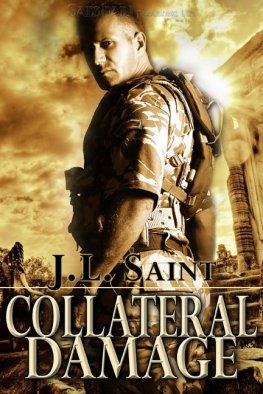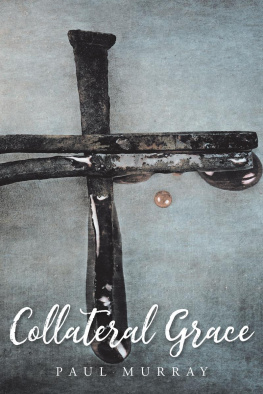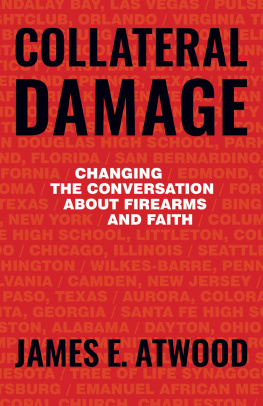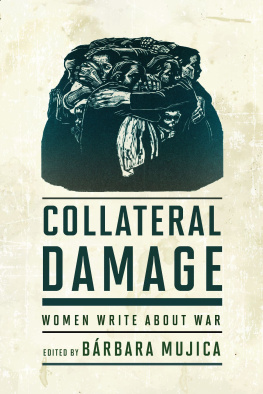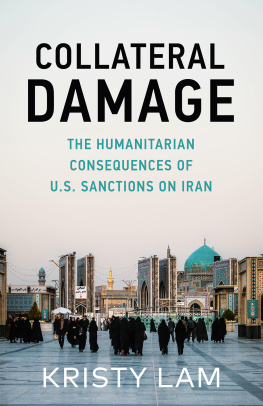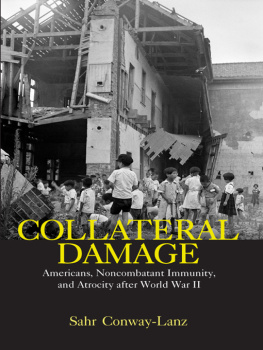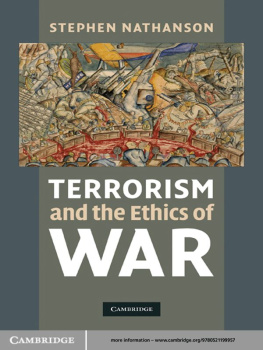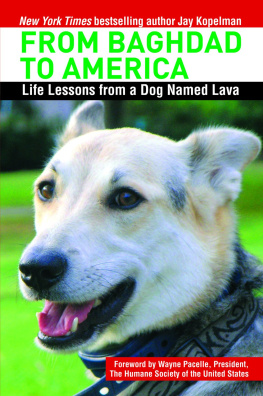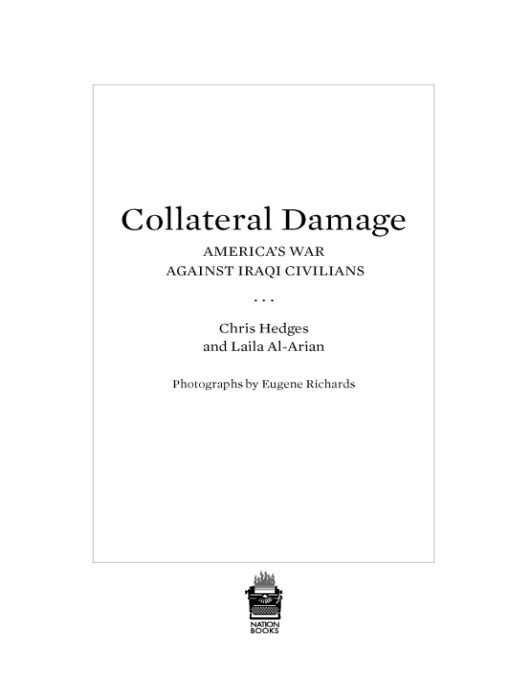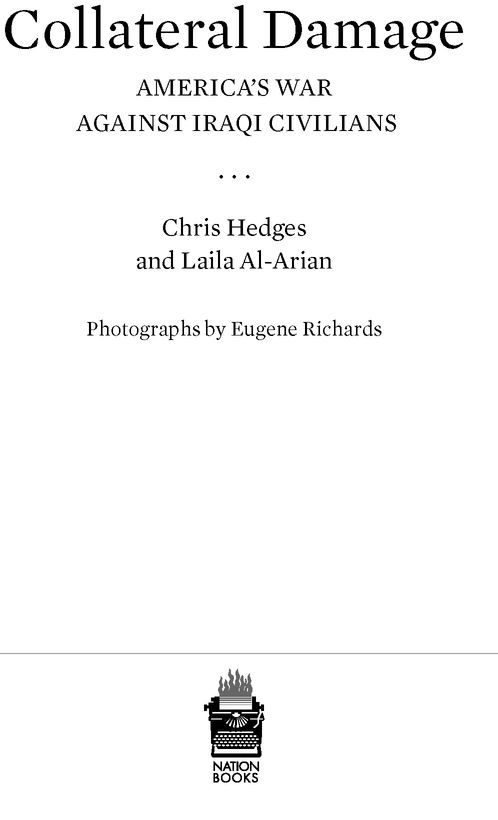Table of Contents
ALSO BY CHRIS HEDGES
War Is a Force That Gives Us Meaning
What Every Person Should Know About War
Losing Moses on the Freeway:
The 10 Commandments in America
American Fascists:
The Christian Right and the War on America
I Dont Believe in Atheists
For Dr. Sami Al-Arian
Thanks for telling me it was a good day until I briefed you. [Redacted name]You are only interested in your career and provide no support to your staffno msn [mission] support and you dont care. I cannot support a msn that leads to corruption, human right abuses and liars. I am sulliedno more. I didnt volunteer to support corrupt, money grubbing contractors, nor work for commanders only interested in themselves. I came to serve honorably and feel dishonored. I trust no Iraqi. I cannot live this way. All my love to my family, my wife and my precious children. I love you and trust you only. Death before being dishonored anymore. Trust is essentialI dont know who trust anymore. [sic] Why serve when you cannot accomplish the mission, when you no longer believe in the cause, when your every effort and breath to succeed meet with lies, lack of support, and selfishness? No more. Reevaluate yourselves, cdrs [commanders]. You are not what you think you are and I know it.
Col. Ted Westhusing
Life needs trust. Trust is no more for me here in Iraq.
COL. TED WESTHUSINGS JUNE 4, 2005,
SUICIDE NOTE WRITTEN TO HIS COMMANDERS IN IRAQ,
GEN. JOSEPH FIL AND GEN. DAVID PETRAEUS
Introduction
Spc. Philip Chrystal, 23, of Reno
Troops, when they battle insurgent forces, as in Iraq, or Gaza, or Vietnam, are placed in atrocity-producing situations. Being surrounded by a hostile population makes simple acts such as going to a store to buy a can of Coke dangerous. The fear and stress pushes troops to view everyone around them as the enemy. The hostility is compounded when the real enemy, as in Iraq, is elusive, shadowy, and hard to find. The rage soldiers feel after a roadside bomb explodes, killing or maiming their comrades, is one that is easily directed over time to innocent civilians, who are seen to support the insurgents. Civilians and combatants, in the eyes of the beleaguered troops, merge into one entity. These civilians, who rarely interact with soldiers or Marines, are to most of the occupation troops nameless, faceless, and easily turned into abstractions of hate. They are dismissed as less than human. It is a short psychological leap but a massive moral leap. It is a leap from killingthe shooting of someone who has the capacity to do you harmto murder. The war in Iraq is now primarily about murder. There is very little killing.
American Marines and soldiers have become socialized to atrocity. The killing project is not described in these terms to a distant public. The politicians still speak in the abstract terms of glory, honor, and heroism, in the necessity of improving the world, in lofty phrases of political and spiritual renewal. Those who kill large numbers of people always claim it as a virtue. The campaign to rid the world of terror is expressed within the confines of this rhetoric, as if once all terrorists are destroyed evil itself will vanish. The reality behind the myth, however, is very different. The reality and the ideal tragically clash when soldiers and Marines return home. These combat veterans are often alienated from the world around them, a world that still believes in the myth of war and the virtues of the nation. They confront the grave, existential crisis of all who go through combat and understand that we have no monopoly on virtue, that in war we become as barbaric and savage as those we oppose. This is a profound crisis of faith. It shatters the myths, national and religious, that these young men and women were fed before they left for Iraq. In short, they uncover the lie they have been told. Their relationship with the nation will never be the same. These veterans give us a true narrative of the warone that exposes the vast enterprise of industrial slaughter unleashed in Iraq. They expose the lie.
This unit sets up this traffic control point, and this eighteen-year-old kid is on top of an armored Humvee with a .50-caliber machine gun, remembered Sgt. Geoffrey Millard, who served in Tikrit with the 42nd Infantry Division. And this car speeds at him pretty quick and he makes a split-second decision that thats a suicide bomber, and he presses the butterfly trigger and puts two hundred rounds in less than a minute into this vehicle. It killed the mother, a father, and two kids. The boy was aged four and the daughter was aged three.
And they briefed this to the general, Millard said, and they briefed it gruesome. I mean, they had pictures. They briefed it to him. And this colonel turns around to this full division staff and says, If these fucking hajis learned to drive, this shit wouldnt happen.
Millard and tens of thousands of other veterans suffer not only delayed reactions to stress but this crisis of faith. The God they knew, or thought they knew, failed them. The church or the synagogue or the mosque, which promised redemption by serving God and country, did not prepare them for the awful betrayal of this civic religion, for the capacity we all have for human atrocity, for the stories of heroism used to mask the reality of war. War is always about betrayal: betrayal of the young by the old, of idealists by cynics, and of troops by politicians. This bitter knowledge of betrayal has seeped into the ranks of Americas Iraq War veterans. It has unleashed a new wave of disillusioned veterans not seen since the Vietnam War. It has made it possible for us to begin, again, to see wars death mask and understand our complicity in evil.
And then, you know, my sort of sentiment of, What the fuck are we doing, that I felt that way in Iraq, said Sgt. Ben Flanders, who estimated that he ran hundreds of military convoys in Iraq. Its the sort of insanity of it and the fact that it reduces it. Well, I think war does anyway, but I felt like there was this enormous reduction in my compassion for people. The only thing that wound up mattering is myself and the guys that I was with. And everybody else be damned, whether you are an IraqiIm sorry, Im sorry you live here, Im sorry this is a terrible situation, and Im sorry that you have to deal with all of, you know, army vehicles running around and shooting, and these insurgents and all this stuff.
The Hobbesian world of Iraq described by Flanders is one where the ethic is kill or be killed. All nuance and distinction vanished for him. He fell, like most of the occupation troops, into a binary world of us and them, the good and the bad, those worthy of life and those unworthy of life. The vast majority of Iraqi civilians, caught in the middle of the clash among militias, death squads, criminal gangs, foreign fighters, kidnapping rings, terrorists, and heavily armed occupation troops, were just one more impediment that, if they happened to get in the way, had to be eradicated. These Iraqis were no longer human. They were abstractions in human form.
The first briefing you get when you get off the plane in Kuwait, and you get off the plane and youre holding a duffel bag in each hand, Millard remembered. Youve got your weapon slung. Youve got a web sack on your back. Youre dying of heat. Youre tired. Youre jet-lagged. Your mind is just full of goop. And then youre scared on top of that, because, you know, youre in Kuwait, youre not in the States anymore.... So fear sets in, too. And they sit you into this little briefing room and you get this briefing about how, you know, you cant trust any of these fucking hajis, because all these fucking hajis are going to kill you. And haji is always used as a term of disrespect and usually with the F-word in front of it.


